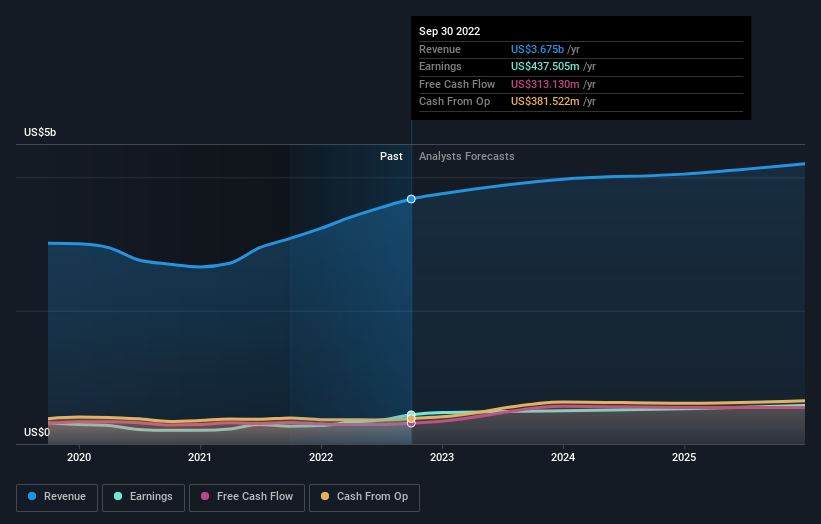- United States
- /
- Machinery
- /
- NasdaqGS:LECO
With 77% institutional ownership, Lincoln Electric Holdings, Inc. (NASDAQ:LECO) is a favorite amongst the big guns

Key Insights
- Significantly high institutional ownership implies Lincoln Electric Holdings' stock prices are sensitive to their trading actions.
- The top 17 shareholders own 50% of the company
- Insiders have been selling lately
If you want to know who really controls Lincoln Electric Holdings, Inc. (NASDAQ:LECO), then you'll have to look at the makeup of its share registry. And the group that holds the biggest piece of the pie are institutions with 77% ownership. That is, the group stands to benefit the most if the stock rises (or lose the most if there is a downturn).
Since institutional have access to huge amounts of capital, their market moves tend to receive a lot of scrutiny by retail or individual investors. Hence, having a considerable amount of institutional money invested in a company is often regarded as a desirable trait.
In the chart below, we zoom in on the different ownership groups of Lincoln Electric Holdings.
Check out our latest analysis for Lincoln Electric Holdings

What Does The Institutional Ownership Tell Us About Lincoln Electric Holdings?
Many institutions measure their performance against an index that approximates the local market. So they usually pay more attention to companies that are included in major indices.
We can see that Lincoln Electric Holdings does have institutional investors; and they hold a good portion of the company's stock. This can indicate that the company has a certain degree of credibility in the investment community. However, it is best to be wary of relying on the supposed validation that comes with institutional investors. They too, get it wrong sometimes. When multiple institutions own a stock, there's always a risk that they are in a 'crowded trade'. When such a trade goes wrong, multiple parties may compete to sell stock fast. This risk is higher in a company without a history of growth. You can see Lincoln Electric Holdings' historic earnings and revenue below, but keep in mind there's always more to the story.

Investors should note that institutions actually own more than half the company, so they can collectively wield significant power. We note that hedge funds don't have a meaningful investment in Lincoln Electric Holdings. The company's largest shareholder is The Vanguard Group, Inc., with ownership of 10%. In comparison, the second and third largest shareholders hold about 8.8% and 5.1% of the stock.
A closer look at our ownership figures suggests that the top 17 shareholders have a combined ownership of 50% implying that no single shareholder has a majority.
While it makes sense to study institutional ownership data for a company, it also makes sense to study analyst sentiments to know which way the wind is blowing. There are a reasonable number of analysts covering the stock, so it might be useful to find out their aggregate view on the future.
Insider Ownership Of Lincoln Electric Holdings
While the precise definition of an insider can be subjective, almost everyone considers board members to be insiders. Company management run the business, but the CEO will answer to the board, even if he or she is a member of it.
Most consider insider ownership a positive because it can indicate the board is well aligned with other shareholders. However, on some occasions too much power is concentrated within this group.
We can see that insiders own shares in Lincoln Electric Holdings, Inc.. It is a very large company, and board members collectively own US$105m worth of shares (at current prices). Most would say this shows a good alignment of interests between shareholders and the board. Still, it might be worth checking if those insiders have been selling.
General Public Ownership
With a 22% ownership, the general public, mostly comprising of individual investors, have some degree of sway over Lincoln Electric Holdings. This size of ownership, while considerable, may not be enough to change company policy if the decision is not in sync with other large shareholders.
Next Steps:
I find it very interesting to look at who exactly owns a company. But to truly gain insight, we need to consider other information, too. Case in point: We've spotted 1 warning sign for Lincoln Electric Holdings you should be aware of.
Ultimately the future is most important. You can access this free report on analyst forecasts for the company.
NB: Figures in this article are calculated using data from the last twelve months, which refer to the 12-month period ending on the last date of the month the financial statement is dated. This may not be consistent with full year annual report figures.
New: AI Stock Screener & Alerts
Our new AI Stock Screener scans the market every day to uncover opportunities.
• Dividend Powerhouses (3%+ Yield)
• Undervalued Small Caps with Insider Buying
• High growth Tech and AI Companies
Or build your own from over 50 metrics.
Have feedback on this article? Concerned about the content? Get in touch with us directly. Alternatively, email editorial-team (at) simplywallst.com.
This article by Simply Wall St is general in nature. We provide commentary based on historical data and analyst forecasts only using an unbiased methodology and our articles are not intended to be financial advice. It does not constitute a recommendation to buy or sell any stock, and does not take account of your objectives, or your financial situation. We aim to bring you long-term focused analysis driven by fundamental data. Note that our analysis may not factor in the latest price-sensitive company announcements or qualitative material. Simply Wall St has no position in any stocks mentioned.
About NasdaqGS:LECO
Lincoln Electric Holdings
Through its subsidiaries, designs, develops, manufactures, and sells welding, cutting, and brazing products worldwide.
Established dividend payer with adequate balance sheet.

